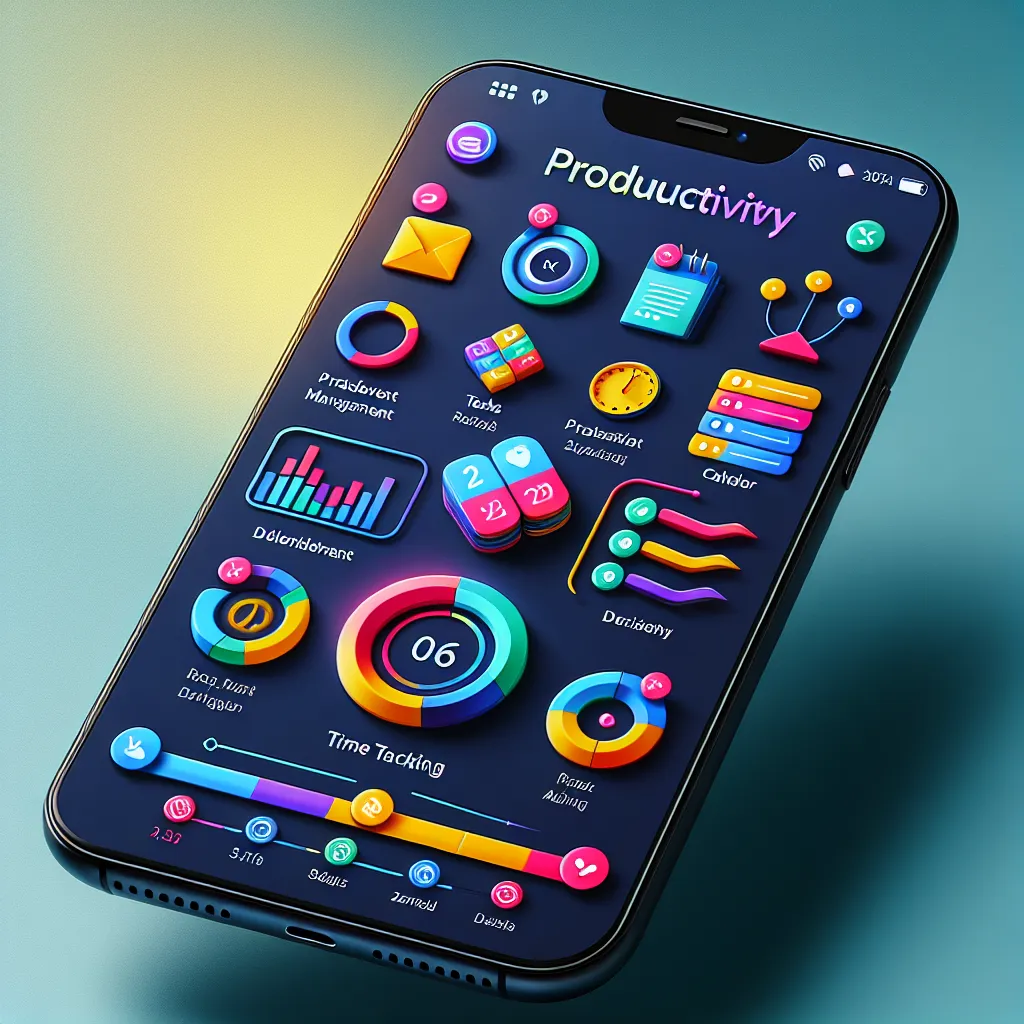In recent IELTS Speaking tests, examiners have frequently asked candidates to describe various aspects of their daily lives, including technology use. The topic “Describe a recent app or tool that improved your daily routine” is increasingly common and likely to appear in future exams. This article will guide you through answering this question effectively, providing sample responses and key strategies to help you achieve a high band score.
 Productivity app on smartphone
Productivity app on smartphone
Part 1: Introduction and Interview
In this section, the examiner may ask general questions about your daily routine and technology use. Here are some potential questions and sample answers:
Do you use any apps or tools to manage your daily tasks?
Band 6-7 Answer:
Yes, I do. I use a to-do list app on my phone to keep track of my tasks. It helps me remember what I need to do each day.
Band 8-9 Answer:
Absolutely. I’m quite reliant on a comprehensive productivity app that syncs across my devices. It’s not just a simple to-do list; it integrates my calendar, project management, and even habit tracking. This all-in-one solution has been instrumental in streamlining my daily workflow and ensuring I stay on top of both personal and professional commitments.
How has technology changed the way you organize your day?
Band 6-7 Answer:
Technology has made it easier to organize my day. I can set reminders on my phone and access my schedule anywhere.
Band 8-9 Answer:
Technology has revolutionized my approach to time management. With cloud-based tools, I can seamlessly transition between work and personal tasks, regardless of my location. The integration of AI in some of my apps even helps predict my needs and suggests optimal times for certain activities, which has significantly enhanced my productivity and work-life balance.
Part 2: Long Turn (Cue Card)
Now, let’s focus on the main topic. Here’s a potential cue card you might receive:
Describe a recent app or tool that improved your daily routine
You should say:
- What the app or tool is
- How you found out about it
- How you use it in your daily life
And explain how it has improved your routine.
Sample Answer (Band 6-7)
I’d like to talk about a fitness app I started using recently. It’s called “FitTrack,” and I found out about it from a friend who was using it to lose weight.
I use this app every day to track my exercise and diet. In the morning, I log my breakfast and plan my workout for the day. The app has many exercise videos, so I can follow along at home. It also counts my steps throughout the day.
This app has really improved my routine because it helps me stay motivated to exercise regularly. I can see my progress over time, which encourages me to keep going. It’s also made me more aware of what I eat, so I’m making healthier choices now.
Overall, FitTrack has made it easier for me to maintain a healthier lifestyle, which has positively impacted my daily routine.
Sample Answer (Band 8-9)
I’d like to discuss a cutting-edge productivity tool I recently incorporated into my daily routine called “Synergy.” I stumbled upon this app while reading a tech blog that was reviewing the latest innovations in time management software.
Synergy is not just a run-of-the-mill task manager; it’s an all-encompassing ecosystem that seamlessly integrates various aspects of my personal and professional life. Every morning, I’m greeted with a customized dashboard that provides an overview of my day, including prioritized tasks, scheduled meetings, and even suggested time blocks for deep work based on my productivity patterns.
One of the most revolutionary features of Synergy is its AI-driven insights. The app analyzes my work habits and offers suggestions to optimize my workflow. For instance, it noticed that I tend to be more creative in the mornings, so it now automatically schedules my brainstorming sessions and content creation tasks during those hours.
Moreover, Synergy has a unique collaborative aspect that allows me to effortlessly coordinate with my team. We can assign tasks, share documents, and track project progress all within the same interface. This has dramatically reduced the time spent on email and status update meetings.
The impact of Synergy on my daily routine has been nothing short of transformative. It has eliminated the mental clutter that often accompanies juggling multiple responsibilities. By providing a clear structure to my day and automating many decision-making processes, Synergy has freed up mental space for more creative and strategic thinking.
In essence, this tool has not just improved my routine; it has revolutionized my approach to time management and significantly boosted my overall productivity and job satisfaction.
Follow-up Questions
- Do you think people rely too much on technology for organizing their lives?
- How might apps and tools like this change the way we work in the future?
Band 6-7 Answer (Question 1):
I think some people do rely too much on technology. It’s good to use apps to help us, but we shouldn’t forget how to organize ourselves without them.
Band 8-9 Answer (Question 1):
While technology undoubtedly offers tremendous benefits in terms of organization and efficiency, there’s a valid concern about over-reliance. The crux of the issue lies in striking a balance. These tools should augment our natural abilities, not replace them entirely. It’s crucial to maintain our cognitive skills and not become overly dependent on digital crutches. That said, when used judiciously, these technologies can significantly enhance our capabilities and free up mental resources for more complex, creative endeavors.
Band 6-7 Answer (Question 2):
I think these apps will make work more efficient in the future. People will be able to do more in less time and maybe work from anywhere.
Band 8-9 Answer (Question 2):
The proliferation of these sophisticated tools is likely to fundamentally alter the landscape of work. We’re moving towards an era of hyper-personalized productivity, where AI-driven apps will adapt to individual working styles and optimize performance on a micro level. This could lead to more flexible work arrangements, as these tools enable seamless remote collaboration and task management. However, it also raises questions about work-life boundaries and digital burnout. The challenge will be harnessing these technologies to enhance human creativity and decision-making, rather than replacing them, ultimately leading to a more dynamic and adaptive workforce.
Part 3: Two-way Discussion
In this section, the examiner will ask more abstract questions related to the topic. Here are some potential questions and sample answers:
How do you think technology has changed the way people manage their time?
Band 6-7 Answer:
Technology has made it easier for people to manage their time. We can set reminders, schedule tasks, and access our calendars from anywhere. This helps people be more organized and productive.
Band 8-9 Answer:
Technology has revolutionized time management in myriad ways. Firstly, it has democratized access to sophisticated planning tools that were once the domain of high-level executives. Now, anyone with a smartphone can utilize AI-driven scheduling assistants and productivity analytics.
Moreover, technology has blurred the lines between work and personal time, leading to both increased flexibility and potential burnout. The ability to work asynchronously across time zones has created a 24/7 work culture that requires a new level of discipline in time management.
Paradoxically, while these tools offer unprecedented control over our schedules, they’ve also led to a phenomenon I’d call ‘hyper-scheduling‘, where people feel compelled to optimize every minute. This can lead to reduced spontaneity and increased stress.
Ultimately, technology has made time management more precise and data-driven, but it has also necessitated a more mindful approach to ensure that efficiency doesn’t come at the cost of well-being and creativity.
Do you believe there are any downsides to relying on apps and tools for daily tasks?
Band 6-7 Answer:
Yes, there can be downsides. People might forget how to do things without apps, or they might spend too much time on their phones. Also, if the app stops working, it can be a big problem.
Band 8-9 Answer:
While the benefits of productivity apps are undeniable, there are indeed potential pitfalls to over-reliance on these tools. Firstly, there’s a risk of cognitive atrophy – as we outsource more mental tasks to apps, we may lose the ability to plan, memorize, and problem-solve independently.
Additionally, the constant connectivity these apps often require can lead to a state of perpetual distraction. The irony is that tools designed to enhance productivity can sometimes hinder deep, focused work if not managed properly.
There’s also the issue of data privacy and security. As we entrust more personal and professional information to these platforms, we become increasingly vulnerable to data breaches or misuse.
Furthermore, the quest for perfect productivity that these apps can engender might lead to a devaluation of downtime and reflection, which are crucial for creativity and overall well-being.
Lastly, there’s a risk of digital divide, where those without access to or proficiency in these tools may be at a significant disadvantage in both personal and professional spheres.
In essence, while these tools can be incredibly useful, it’s crucial to approach them with a critical eye and maintain a balance between technological assistance and human agency.
Key Vocabulary and Phrases for High Scores
-
Streamline /ˈstriːmlaɪn/ (verb): To make a system or organization more effective and efficient by employing faster or simpler working methods.
Example: The new app helped streamline my workflow, reducing the time I spent on administrative tasks. -
Integrate /ˈɪntɪɡreɪt/ (verb): To combine two or more things in order to become more effective.
Example: The software integrates seamlessly with my existing calendar, making scheduling a breeze. -
Revolutionize /ˌrevəˈluːʃənaɪz/ (verb): To change something completely and dramatically.
Example: This productivity tool has revolutionized the way I approach my daily tasks. -
Optimize /ˈɒptɪmaɪz/ (verb): To make something as good or effective as possible.
Example: The AI features in the app help optimize my schedule for maximum productivity. -
Ecosystem /ˈiːkəʊˌsɪstəm/ (noun): A complex network or interconnected system.
Example: The app provides a complete productivity ecosystem, from task management to team collaboration.
Examiner’s Advice
To achieve a high score in the IELTS Speaking test, particularly when discussing technology and daily routines:
- Use a wide range of vocabulary, including less common words and phrases related to technology and productivity.
- Demonstrate your ability to discuss abstract concepts by exploring the broader implications of technology on society and work culture.
- Provide specific examples from your personal experience to illustrate your points.
- Show your critical thinking skills by discussing both advantages and potential drawbacks of relying on technology.
- Practice speaking fluently and coherently on this topic, organizing your ideas logically.
- Work on your pronunciation and intonation to ensure clarity in your speech.
Remember, the key to success in the IELTS Speaking test is not just about what you say, but how you say it. Confidence, fluency, and the ability to express complex ideas clearly are all crucial factors in achieving a high band score.
For more tips on improving your IELTS Speaking skills, check out our article on how to describe a new skill you learned during lockdown, which can provide additional insights into effective speaking strategies.


